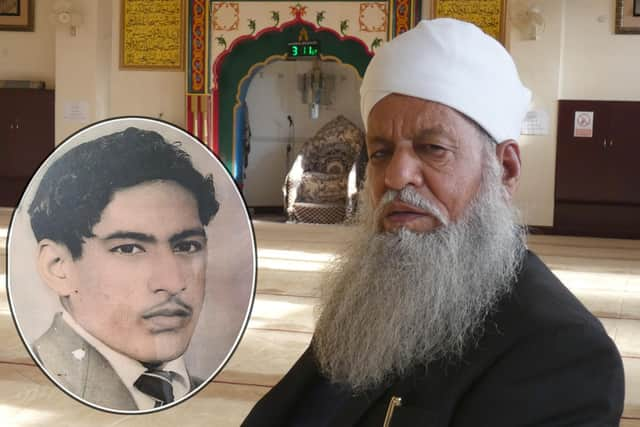'It was the first time I had seen snow': Haji Ji tells his story of coming to Dewsbury from Pakistan to make a new life at 24
and live on Freeview channel 276
Here, we take a look back at his fascinating account.
Mr Afzal was part of a large group of Indian and Pakistani nationals who were encouraged to come and work in our local mills throughout the post-war decades of the 1960's and 1970's.
These men came to Britain because of a severe labour shortage existing during that period across the whole country.


Advertisement
Hide AdAdvertisement
Hide AdAs someone who now belongs to a dwindling generation, Mr Afzal agreed to be interviewed for the Kirklees Faith Network's "Ravensthorpe Stories In A Suitcase Project".
This feature is an account from Mr Afzal of what he lived through during those first several years of his life in Dewsbury town.
Mr Afzal said: "I came to England in July 1960 and stayed in Derby for two months until I moved to Dewsbury in September of that same year.
“My family in Pakistan had a military background going back to the days of the British Raj. Some of my uncles had served as British-Indian Army soldiers during the Second World War.
Advertisement
Hide AdAdvertisement
Hide Ad“So, I suppose their strong military values of duty, discipline, hard work, and respect for the rule of law, were also running in my blood.
"My first home in Dewsbury was on a Westtown cul-de-sac known as Hanover Square. This dwelling was just a small two-bedroom house, with one living room, and one tiny kitchen.
"I can recall going to bed early on my first evening only to wake up next morning and to see the ground outside covered with a strange white stuff. This was the first time I had ever seen snow in my life.
“I went downstairs and opened the creaking door to take a closer look at the surface. To my shock, I slipped and was nearly about to fall on the steps with a heavy thud. I may have ended up breaking an arm or even a leg if my hands had not quickly got hold of the door handle.
Advertisement
Hide AdAdvertisement
Hide Ad"As the weeks passed, I realised these slippery snowfalls were not going to stop. In fact, I saw nothing but heavy snow and dangerous 'black ice' for the first six months of my 'new' life in Dewsbury.
“Yet, I had no choice except to get my two feet used to the treacherous weather conditions especially if I was to go out looking for work.
“I saw an era when the first snows could start falling by mid-September, and then continue doing so throughout October, November, December, into Christmas and the new year, towards spring, and even up till the so-called 'Summer' months of May or June!
“Besides these snowfalls, I was also living a life in my house without having access to instant running hot water – something that would be unthinkable today!
Advertisement
Hide AdAdvertisement
Hide Ad"Because there were no boilers, freezing cold water coming out of a small kitchen tap had to be heated in a pan. Keeping myself as well as my home warm was a big challenge in the harsh frosty weather of those days.
"Things remained the same when I moved into a new house on North Road in Ravensthorpe. There were no wooden floorboards anywhere downstairs. Instead, the whole floor was covered with slabs of large dark paving stones separating a cellar below where I would later keep sacks of coal to light in the living room's fireplace.
“Coal was everything in those days because people from my generation had to live in these small very cold properties without any central heating, or radiators, and without any gas fires!
"Even warming up the fireplace was time consuming. A shovel of coal had to be bought upstairs from the cellar. Lighting up the damp coal with matches could take several minutes.
Advertisement
Hide AdAdvertisement
Hide Ad“Many of the men like me never bothered when coming home from work on most nights because we were often shattered after doing a long twelve hour shift in the mill. In my situation, I usually heated up a plate of curry with some chapatis to eat quickly in my cold kitchen. I would then read my evening 'Namaz' prayers and go straight to bed.
"But as a newly arrived Pakistani migrant, I was ready to put up with these drab living conditions.
“At the time I felt convinced like most workers from the Sub-Continent during the post-war period that we would only stay in England for a few years before the Home Office was to order us to leave the country. So, I had the patience to accept my 'temporary' lifestyle.
"But if the winters were cruel, then the people's warm friendly generosity used to compensate for the cold harsh weather. The vast majority of Ravensthorpe’s white English-speaking residents were always very helpful.
Advertisement
Hide AdAdvertisement
Hide Ad"My own English neighbours were more than happy to accept me living next door to them. They did not mind keeping an eye on my property whilst I went to work. The elderly couple would cheerfully remove my clothes off the washing line if it was raining heavily.
“The neighbour's wife was even so kind as to iron my shirts or woollen pullovers, and to bring them around for me neatly folded in a big basket when I returned home from the mill.
“This was the strong community spirit existing in our neighbourhoods during those post-war years."